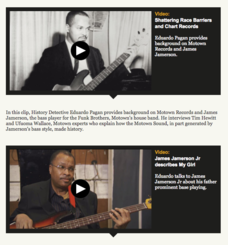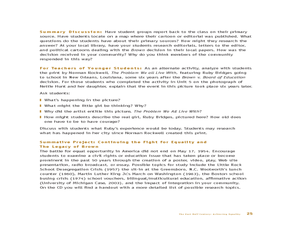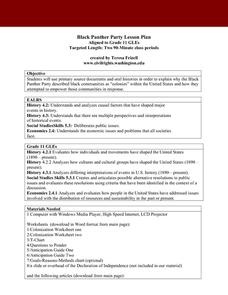Curated OER
Nonviolence the Road to Freedom
Eleventh graders discuss the use of nonviolence. In this civil rights movement lesson, 11th graders write a journal entry on the differences between Rosa Parks and Martin Luther King Jr., discuss nonviolence and create a poster...
National Woman's History Museum
Songs of Protest: Seneca Falls to Vietnam
Long before the songs of the 1960's Peace Movement, long before the songs of the Civil Rights Movement, and even before the songs of the Abolition Movement, were the songs of the Suffrage Movement. To understand the power of protest...
Defining US
Integration of Education and American Society
How did the struggle for Civil Rights during the 1950s transform American society and politics? Why are American schools integrated today? Class members explore these essential questions by examining a series of primary and secondary...
Curated OER
Desegregation of Schools
Young scholars explore ways African American students were discriminated against in the 1960's. In this United States History lesson, young scholars read three famous poems on the Civil Rights Movement then write their own poem.
Curated OER
Rosa Parks and the Montgomery Bus Boycott
Students dramatize incident that started the civil rights movement of the 1950s and 1960s: Rosa Parks's refusal to give up her seat on a bus in Montgomery, Alabama.
Teaching Tolerance
Using Photographs to Teach Social Justice | Confronting Unjust Practices
A powerful photograph of the Freedom Riders of 1961 launches an examination of the de jure and de facto injustices that the civil rights movement of the 1950s and 1960s addressed. Young historians first watch a video and read the Supreme...
American Institute of Physics
African American Physicists in the 1960s
Physicists Herman Branson and Tannie Stovall provide young scholars with two very different perceptions of the status of African American physicists in the 1960s. After reading and comparing the bios of these two men, class members read...
Museum of Tolerance
Making Lemonade: Responding to Oppression in Empowering Ways
An activity focused on tolerance encourages class members to consider how they might respond when they or someone else is the target of oppression and discrimination. After researching how some key figures responded to the anti-Semitism...
Curated OER
JFK, LBJ, and the Fight for Equal Opportunity in the 1960s
High schoolers examine the presidencies and John F. Kennedy and Lyndon B. Johnson. In this American history lesson, students specifically analyze the civil rights support of the 2 presidents and their support of civil rights legislation....
PBS
March on Washington: A Time for Change
Young historians conclude their study of the events that lead up to and the planning for the March on Washington. After examining videos and primary source documents, they consider the civil rights objectives that still need to be...
Curated OER
Martin Luther King and Malcom X on Violence and Integration
Dr. Martin Luther King and Malcolm X were contemporaries. Both were gifted orators, both were preachers, both were leaders during the Civil Rights era, both were assassinated. But the two had very different views on violence and...
Center for History Education
Contextualizing a Historical Photograph: Busing and the Anti-busing Movement in Boston
The anti-busing movement in Boston is the focus of a instructional activity that asks young historians to examine primary source documents to identify the causes and consequences of busing pupils from one area of the city to another in...
Anti-Defamation League
Shirley Chisholm: Unbought, Unbossed and Unforgotten
A 13-page packet introduces high schoolers to a lady of amazing firsts. Shirley Chisholm was the first Black woman elected to Congress, the first Black woman to run for President of the United States, and a leader of the Women's Rights...
Learning for Justice
Mary Church Terrell
Excerpts from an 1898 speech by civil rights activist Mary Church Terrell offers young scholars an opportunity to investigate how Black American women fought for civil rights long before Rosa Parks and the civil rights movement of the...
PBS
Racial Equality: How Far Have We Come and How Far Do We Have To Go?
Is everyone treated fairly in America? The culminating fifth lesson from a series of five has pupils explore racial inequalities from the 1960s and decide whether or not society has changed over time. The lesson comes with a speech from...
Curated OER
Black Separatism or the Beloved Community? Malcolm X and Martin Luther King, Jr.
Students interpret historical evidence presented in primary and secondary resources. In this African American history lesson, students compare and contrast the tactics employed by Malcolm X and Martin Luther King,...
PBS
The Sixties: Hitsville USA
James Jamerson. You probably heard him but may not have heard of him. But fans of Motown Records will certainly recognize his contributions to the sound that desegregated popular music during the 1960s. Challenge young history detectives...
Curated OER
The Past Half Century: Achieving Equality
Students analyze reactions to the Brown vs. Education decision of 1954. In this segregation instructional activity, student look at the actions that were taken in the education world as a result of the Brown decision. They watch a CD,...
National Endowment for the Humanities
Revolution '67, Lesson 2: What Happened in July 1967? How Do We Know?
Even in a world in which dozens of participants and curious onlookers record every controversial event, the basic facts of what happened are often in dispute. Revolution '67, Lesson 2 explores 1967 Newark, New Jersey using an examination...
National Woman's History Museum
Gloria Steinem, Feminism and “Living the Revolution"
Excerpts from Feminine Mystique by Betty Friedan and from Gloria Steinem's "Living the Revolution" provide high schoolers an opportunity to study the feminism of the 1950s and 1960s, sometimes called the "Second Wave of Feminism."
National Endowment for the Humanities
Revolution '67, Lesson 1: Protest: Why and How
To some people, protesting is as American as apple pie, but the factors that lead to protests can be as confusing to veteran activists as to today's youth. Revolution '67 explores the riots in Newark, New Jersey as a case study. Using...
Curated OER
Black Panther Party Lesson Plan
Why did the Black Panther Party feel colonized, and what methods did they employ to achieve empowerment? Your class members will engage in an online PowerPoint presentation, analysis of several documents, and discussion in order to...
PBS
The Sixties: Dylan Plugs in and Sells Out
Before Woodstock, there was Newport. Get plugged in to the social changes of the 1960s with a lesson that looks at Bob Dylan's performance at the 1965 Newport Folk Festival as a symbol of the radical changes that marked the era.
Global Oneness Project
Repairing the Fabric of Democracy
During elections, headlines constantly lament the issue of low voter turnout. Help class members understand why this is such an important topic with relevant articles, a discussion of both sides of the issue, and a reflective essay.

























